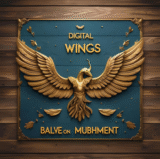Table of Contents
- Introduction: Why Digital Marketing Matters in 2025
- What is Digital Marketing? (Simple Explanation)
- Key Components of Digital Marketing
- SEO (Search Engine Optimization)
- Content Marketing
- Social Media Marketing
- PPC (Pay-Per-Click Advertising)
- Email Marketing
- Influencer Marketing
- Affiliate Marketing
- Benefits of Digital Marketing for Businesses
- Traditional Marketing vs. Digital Marketing
- Digital Marketing Strategy in 2025 (Step-by-Step)
- Top Digital Marketing Tools You Must Know
- Digital Marketing Trends in 2025
- Challenges in Digital Marketing (and How to Overcome Them)
- FAQs
- Conclusion

. Introduction: Why Digital Marketing Matters in 2025
In today’s hyper-connected world, digital marketing has become the backbone of every successful business. Whether you run a small shop, a startup, or a multinational company, reaching your customers online is no longer optional—it’s essential. In 2025, with AI-driven ads, voice search, and social media dominance, businesses that ignore digital marketing risk being invisible.
2. What is Digital Marketing? (Simple Explanation)
Digital marketing is the promotion of products or services using digital channels like Google, Facebook, Instagram, YouTube, email, and websites. Unlike traditional marketing (TV, radio, print), digital marketing allows real-time tracking, targeted ads, and higher ROI.
👉 Example: If you own a bakery, running a Facebook ad campaign for people within 5 km who love cakes is far more effective than giving flyers to everyone.
3. Key Components of Digital Marketing
3.1 SEO (Search Engine Optimization)
SEO means optimizing your website so it ranks higher on Google. In 2025, SEO is not just about keywords, but also about user experience, AI-generated content detection, and voice search optimization.
- Example: Ranking on Google for “best digital marketing course in India” can bring thousands of visitors.
- Tools: SEMrush, Ahrefs, Google Search Console.
3.2 Content Marketing
“Content is king” still rules in 2025. Blogs, videos, infographics, and podcasts help businesses educate and attract customers.
- Example: Writing a blog on “10 Instagram Reels Hacks in 2025” can bring organic traffic from Google.

3.3 Social Media Marketing
Social media platforms like Instagram, TikTok, YouTube, and LinkedIn are key to brand awareness.
- Example: Nike uses Instagram reels to launch new products and connect with younger audiences.
3.4 PPC (Pay-Per-Click Advertising)
PPC allows businesses to show ads on Google or social media and pay only when someone clicks.
- Example: Running Google Ads for “best digital marketing agency near me” ensures you reach buyers at the right time.
3.5 Email Marketing
Still one of the highest ROI strategies. Personalized newsletters, offers, and automated campaigns can nurture leads.
- Tools: Mailchimp, ConvertKit.
3.6 Influencer Marketing
Collaborating with influencers increases trust. In 2025, micro-influencers with 10k–50k followers bring better engagement than celebrities.
3.7 Affiliate Marketing
Promoting products/services and earning a commission for each sale. Amazon Associates is a classic example.
4. Benefits of Digital Marketing for Businesses
- Global reach at a low cost
- Better audience targeting
- Measurable results
- Builds customer trust
- 24/7 availability

5. Traditional Marketing vs. Digital Marketing
| Feature | Traditional Marketing | Digital Marketing |
|---|---|---|
| Cost | High (TV, Radio, Print) | Lower (Ads, SEO, Social Media) |
| Tracking | Difficult | Easy with Analytics |
| Reach | Local/National | Global |
| Interaction | One-way | Two-way (engagement) |
6. Digital Marketing Strategy in 2025 (Step-by-Step)
- Define business goals
- Identify target audience
- Choose right digital channels
- Create engaging content
- Optimize website for SEO + mobile
- Run paid campaigns (Google Ads, Facebook Ads)
- Measure performance using analytics
7. Top Digital Marketing Tools You Must Know
- SEO: SEMrush, Ahrefs
- Social Media: Buffer, Hootsuite
- Email: Mailchimp, ConvertKit
- Analytics: Google Analytics, Hotjar
- Design: Canva, Figma

8. Digital Marketing Trends in 2025
- AI-powered personalized ads
- Voice search optimization
- Short-form video dominance (Instagram Reels, TikTok, YouTube Shorts)
- Interactive content (polls, quizzes)
- Data privacy-driven marketing
9. Challenges in Digital Marketing (and How to Overcome Them)
- High competition → Focus on niche targeting
- Ad fatigue → Refresh creatives frequently
- Data privacy rules → Transparent, consent-based marketing
- AI replacing content creators → Focus on authenticity
10. FAQs
Q1. What is the importance of digital marketing in 2025?
Digital marketing is essential because more than 70% of consumers research online before buying anything.
Q2. Can small businesses benefit from digital marketing?
Yes, small businesses can reach local audiences effectively through SEO, Google My Business, and social media.
Q3. Which is better: SEO or PPC?
SEO is better for long-term growth, while PPC is good for instant results. The best strategy is a mix of both.
Q4. How much does digital marketing cost?
It depends on goals and channels. A small business may start with $200/month, while large companies spend millions.
Q5. Is AI the future of digital marketing?
Yes, AI is already transforming targeting, personalization, and customer support.
Q6. What skills are required to become a digital marketer in 2025?
SEO, content writing, social media management, data analytics, and AI tools.
11. Conclusion
Digital marketing in 2025 is not just about promoting a business—it’s about building relationships, trust, and delivering value. Whether you’re a beginner or a business owner, understanding digital marketing is the key to success in today’s competitive world.
